At first sight, Tokyo can be overwhelming. It is a huge modern city where skyscrapers rub shoulders with tradition and where the neon light skyline fills your world after the sun goes down. Japan’s capital and largest city has a population of 14 million while the greater metropolitan area has a further 24 million. It attracts a huge number of visitors each year, both tourists and business travellers. You can expect to see old Edo houses, stunning temples and lovely gardens even within a built-up area. Although the infrastructure is well-developed with plenty of accommodation, restaurants, bars and nightlife in general, it’s worth researching where to stay in Tokyo.
From budget accommodation to luxury digs, Tokyo has it all but there are so many options to choose from. After reading on, you will hopefully have a good insight into the best neighbourhood to meet your financial needs and satisfy your main interests. Tokyo has a good transport infrastructure yet there are strains because of the sheer number of people living in the city. Punctuality is a feature of the Japanese, so you can expect transport timetables to be accurate. Here are six neighbourhoods to consider before you make your choice and in each case, there are three suggested hotels with ideas in a range of prices.
Contents
Where To Stay In Tokyo
1- Shinjuku
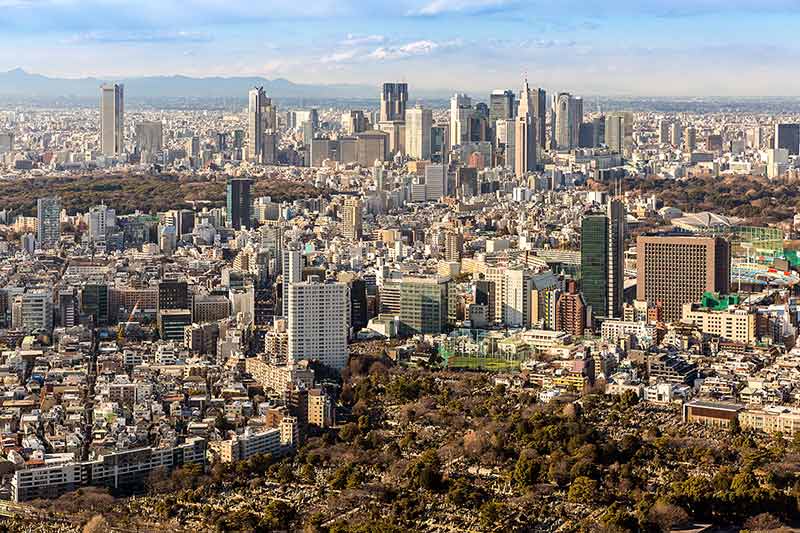
Shinjuku is probably the best neighbourhood to stay if you have not been to Tokyo before although budget accommodation is limited.
The reason it’s popular is the area is full of good eateries, including street food, shopping and entertainment venues of all kinds.
Neon lights and skyscrapers are everywhere.
You can shop by day then see Shinjuku come alive at night.
Tucked among the modern buildings are narrow streets where little has changed for many decades, such as Memory Lane.
The train station links you to all parts of Tokyo and beyond both nationally and to the international airport.
One of the iconic attractions in Japan is Mount Fuji.
If it is clear, you will be able to see it from the 200 metres (660 feet) high observation deck in Shinjuku’s Tokyo Metropolitan Building, and entry is free!
The Samurai Museum is most impressive and you can get a performance of these warriors with their swords.
The Japanese Garden is over 100 years old and opened to the public after the Second World War, a green oasis in the midst of this bustling neighbourhood that was once a private retreat for the emperor.
You will be very impressed by the shopping opportunities which includes malls where you may need to be careful not to give your credit cards too much punishment.
The malls, indeed the whole of the neighbourhood, is busy and you should expect that, especially at weekends and by night.
There is a red-light district with several dubious bars so you will need to be on your guard, especially as an obvious tourist.
The district is known as Kabukicho and the Yakusa, the local mafia run a number of businesses there.
Pros
- Convenient transportation
- Plenty of entertainment and nightlife
- Excellent shopping
- Close to many cultural attractions
- A range of accommodation from budget to luxury
Cons
- Crowded, busy and noisy
- Cost of accommodation and dining can be a bit higher than other areas
- A bit touristy
Hotels in Shinjuku
Luxury: Park Hyatt Tokyo
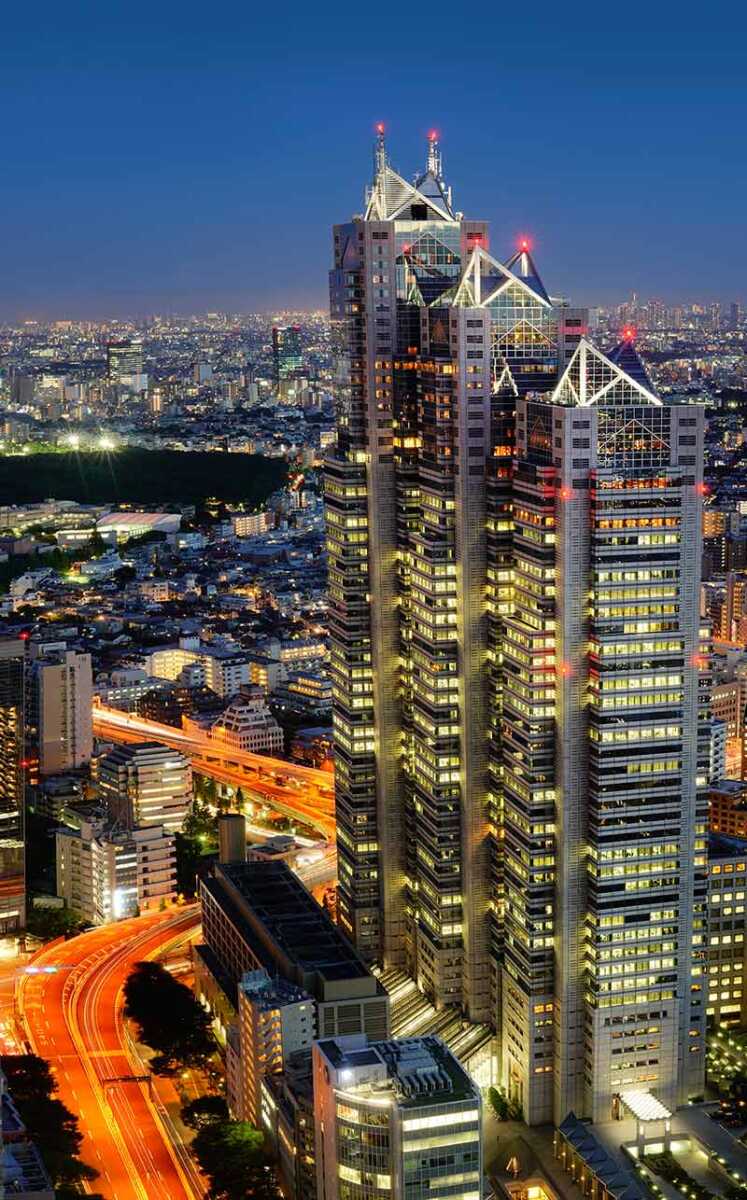
Park Hyatt Tokyo is one of Tokyo’s most exclusive and luxurious hotels, famous for its use in the film, “Lost in Translation.”
Its guests enjoy world-class cuisine, facilities including an indoor pool, spa and fitness centre.
This hotel is a great choice if it fits your budget.
Mid-range: Hotel Gracery Shinjuku
Hotel Gracery Shinjuku within the Shinjuku Toho Building provides wonderful views over the area.
Its huge rooftop Godzilla head lit up after dark is a local star attraction with only hotel guests allowed on the rooftop.
It is central to everything with the station just a block away.
A unique feature is the women-only floor for solo travellers.
Budget: Imano Tokyo Hostel
Imano Tokyo Hostel is modern and clean close to the underground with separate male and female dormitories as well as family rooms with four bunks.
There are privacy curtains within the dormitories with electric in each unit suitable for charging your phone and laptop.
2- Shibuya And Harayuku
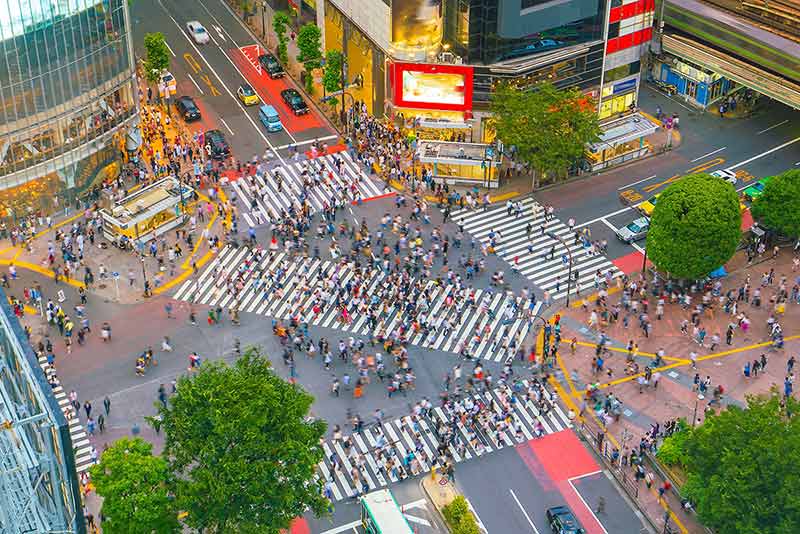
If good nightlife is your priority, then Shibuya is probably the place for you.
Shibuya and Harajuku never seem to close; there is plenty to see and do with good shopping as well.
The Meiji-Jingu Shrine (free entry) and Yoyogi-Koen Park are two of the area’s highlights.
Central Shibuya seems to attract a younger crowd than Shinjuku and you will see this in places like Hachiko Plaza in front of the station.
Expect to see the latest colourful fashions within the Japanese younger generation, and often equally colourful hair.
If you are travelling as a family with teenagers, they are certain to love this neighbourhood.
Shibuya also has a new observation deck, Shibuya Sky at the top of one of its shopping malls.
You can go to the 47th floor at a height of 229 metres (750 feet) for spectacular views over the whole city.
If you are looking to night clubs, head along Centre-Gal Street to Love Hotel Hill.
The Photographic Art Museum is a “must see” if you are interested in photography and its skills.
The Folk Crafts Museum is another place you are likely to find interesting.
The neighbourhood is another one that is very busy but you will find a quieter area, and an interesting one, Kyu-Shibuya-gawa Yuhodoro, “Cat Street” where there are plenty of cafes, boutiques and fashion shops down little side streets.
Shibuya Station is a major transport hub in Tokyo, thereby making it the district a convenient base.
It is on the Yamanote Line (Tokyo Loop Line) circling the most visited parts of Tokyo.
Harajuku, a small part of Shibuya is the heart of city’s goth/ zombie/ emo-like subculture.
It’s a fun place for people-watching as well as clothes and second-hand shopping.
Pros
- Vibrant nightlife with lots of bars, clubs and restaurants
- Convenient transport
- Excellent shopping
- Diverse dining options
Cons
- Crowded, noisy and busy
- Very contemporary feel with limited traditional charm
Hotels in Shibuya
Cerulean Tower Tokyo Hotel
Cerulean Tower Tokyo Hotel located next to Shibuya Station, overlooks the famous Shibuya crossing.
All rooms are on the 19th floor and above so you will get views of city and Mount Fuji on a clear day.
Facilities include the Garden Lounge on the rooftop and the 40th floor Jazz Club.
With eight restaurants, there is a huge range of cuisine available each day.
Shibuya Stream Hotel
Shibuya Stream Hotel is new hotel with large floor-to-ceiling windows in every room.
It is centrally located yet quiet at night, a 4-star hotel within the Shibuya Stream skyscraper building with four floors of shops, cafes and restaurants.
Millenials Shibuya
The Millenials Shibuya is a 2-star capsule hotel for adults only with a single female-only floor.
Expect privacy from the shutter-like curtains of the capsules.
There is air-con, free Wi-Fi, a terrace, shared lounge and kitchen.
Free coffee is available in the lobby and a complimentary beer during happy hour.
3- Ginza And Tokyo Station
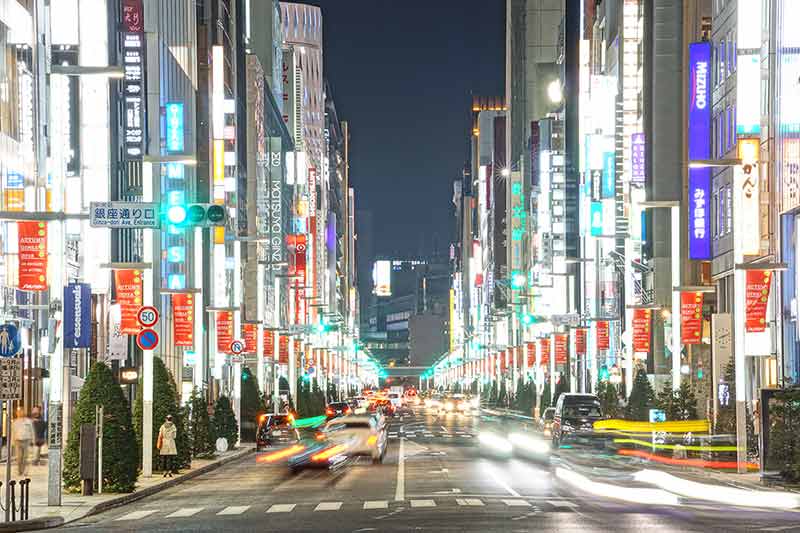
The Ginza and Tokyo Station area is another neighbourhood worth serious consideration as it’s a quieter, more relaxed place than the two neighbourhoods already discussed.
Its broad streets may remind you of boulevards like Oxford Street in London or Fifth Avenue in New York.
It was one of the parts of Tokyo that underwent modernisation way back in the 1870s with Western-style buildings and shopping malls.
Some of Tokyo’s best hotels are found here while several famous international brands have chosen Ginza for retail activity.
This is a neighbourhood that is ideal for families with good subway links to other parts of the city.
However, you will not find budget accommodation and be prepared to pay more for things here than in some other parts of Tokyo.
The Imperial Palace and its lovely gardens are here and this is regarded as the actual centre of Tokyo.
You can walk around the gardens without charge or book a tour in advance but the Palace itself is only open for two days a year, 2 January and the Emperor’s birthday, currently 23 December.
Close by is the important business district of Marunouchi, hence the presence of quality hotels.
You will find Tokyo Station here, a grand 20th century building that was renovated in 2012.
It is located on the Tokyo Loop Line and is convenient for travel to the international airport.
You can easily walk to nearby Tsukiji and its famous market. The fish market was once where among other things you could watch the auctioning of valuable tuna that has now moved to Toyosu but the Tsukiji market is still popular for its stalls, food and local atmosphere.
Pros
- Great for upscale dining and shopping
- Centrally located with excellent public transport
- Cultural attractions
Cons
- It’s a luxury district for hotels, dining and shopping so costs are higher
- A more businesslike feel than other areas
Hotels In Ginza
Tokyo Station Hotel
Tokyo Station dates back to 1915, being completely renovated in 2012, deservedly included in the “Small Luxury Hotels in The World” chain.
Rooms in classical European style have all modern comforts.
Great food, wonderful service, you can expect 5-star quality throughout.
The Square Hotel Ginza
The Square Hotel Ginza Is a stylish hotel in the midst of Ginza’s shopping area.
The Onsen (hot spring/ public bath) is a great place to relax after a busy day.
The hotel provides excellent value in upmarket Ginza with plenty of restaurants, shops and cafes on its doorstep.
Royal Park Hotel
The Royal Park Hotel Is a classy 4-star hotel offers great views from its location on top of the Shiodome Tower.
Everything you might want is in the surrounding streets while the Tsukiji fish market is a 15 minute-walk away.
Rooms are small but comfortable and clean, with air-con, flat-screen tv, fridge and safe.
For more about Japan, read:
- 20 Incredible Landmarks in Japan
- 20 Best Beaches In Japan
- 25 Things To Do In Tokyo At Night
- 25 Landmarks In Tokyo
- A Guide To Winter In Japan
- 50 Things To Do In Japan
- Japan Itinerary (10 days)
- Where To Stay In Tokyo
- Osaka Itinerary
- Nagoya Itinerary
- Where To Stay In Nagoya
- 12 Things To Do in Takayama
- How To Use The Toilets In Japan
- Osaka Itinerary
- 20 Things To Do In Osaka At Night
- Where To Stay In Osaka
- 20 Things To Do In Hiroshima
- Where To Stay In Hiroshima
- 20 Things To Do In Yokohama
- 15 Things Japan Is Famous For
- 20 Things To Do In Kamakura
- 20 Things To Do In Nagano
- 20 Day Trips From Tokyo
- 3 Day Trips From Osaka
- The Most Beautiful Japan Tourist Spots
- Hakuba Hotels
- Hakuba Ski Resort
- Japanese Onsen Tips
- Where To Stay In Kyoto Like A Local
- Arashiyama Monkey Park
- Eating and Drinking Matcha
- Amanemu Review
- 20 Japanese Drinks
- 20 Things To Do In Kyoto At Night
- 20 Japanese Cities
- 20 Things To Do In Fukuoka
- Where To Stay In Fukuoka
- 20 Things To Do In Nara
- 20 Things To Do In Hakone
- 20 Things To Do In Sapporo
- Where To Stay In Sapporo
- 20 Things To Do In Kanazawa
- 20 Things To Do In Okinawa
- 20 Things To Do In Sendai
- 20 Things To Do In Saitama
4- Ueno
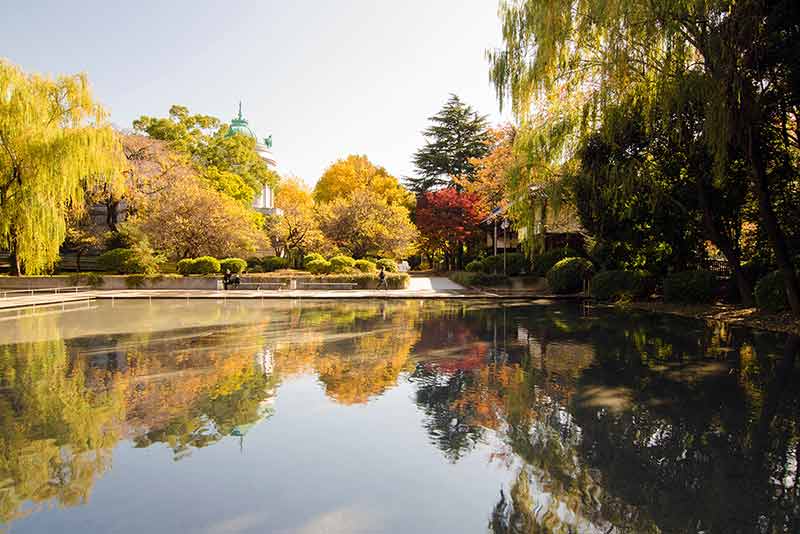
If you are on a budget, Ueno may be a good option as it’s a relatively quiet neighbourhood home to several of the city’s museums.
It has a feel of the old city, with the old wooden houses of Yanaka an example of that those times.
Don’t expect much in the way of nightlife so if you are looking for excitement after dark you will need to travel.
Ueno Station provides a link to other parts of Tokyo and beyond but if you make this your base, visit the local park which has been a city attraction since the Edo period (17th century to the second half of the 19th century).
As you walk around the park you will see museums and shrines, historical buildings and a number of temples.
The most famous of the shrines is a fine example of Shinto architecture dating back to the 17th Century, Ueno Toshogu Shrine.
Locals fill the park at weekends and holiday times enjoying acrobats and other performers.
Japan in famous for its springtime cherry blossom and the park is filled with it at that time of the year.
The park opened to the public in 1873 but some of the buildings are much older.
Tokyo National Museum has the largest collection of Japanese art and exhibits, all labelled in English as well as Japanese.
Exhibits include samurai swords and armour, beautiful kimonos, pottery and sculptures as well as ukiyo-e, the famous antique woodblocks that were used in printing.
There are several buildings so if you have limited time, you should do your research to look for the things that most interest you.
Pros
- Cultural and historic attractions
- Green spaces – Ueno Park
- Ueno station is a major transport hub
- Lively street food and market
Cons
- Crowded and noisy
- More subdued nightlife
- Fewer luxury options
Hotels in Ueno
Nohga Hotel Ueno Tokyo
Nohga is boutique hotel close to JR Ueno Station, offering perks like comfortable pyjamas, free bicycle rentals, maps and guidebook.
Some rooms have a kitchen and triple rooms are also available.
Mimaru Tokyo Ueno East
Mimaru Tokyo Ueno East is a 4-star modern apartment hotel each unit with a private bathroom, air-con, a TV, small kitchen with microwave and a dining table.
Nearby shopping is good with each apartment suitable for up to four people.
ICI HOTEL Ueno Shin Okachimachi
ICI is 3-star, modern, clean and comfortable.
You can walk to either JR Ueno Station or Okachimachi Subway Station.
There are plenty of shops close by and this quiet location offers excellent value.
5- Asakusa
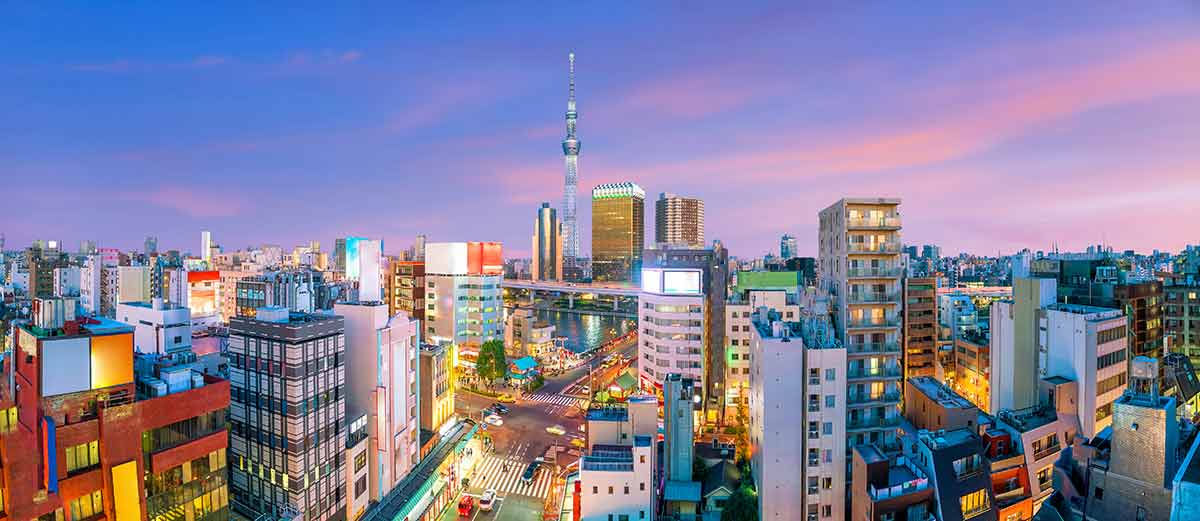
Asakusa, in the older part of Tokyo, looks much the same as it did many decades ago.
With one exception, there are none of the skyscrapers associated with other popular parts of the city.
You will find plenty of ancient temples, shrines and rickshaws.
You will also find plenty of choice of mid-range accommodation.
That exception is Tokyo’s highest building, the Tokyo Sky Tree.
It is almost like it was dropped in Asakusa by mistake by aliens.
Tokyo Sky Tree was the highest free-standing communication tower in the world when it opened in 2012.
It is 634 metres (2,080 feet) high with two observation desks accessible by elevator.
Both provide great panoramas and on a clear day you can see Mount Fuji.
Senso-ji Temple is the neighbourhood’s best- known landmark.
It was built in 1400, the oldest temple in the city.
This is the neighbourhood known for Japan’s famous sumo wrestlers.
The National Sumo Stadium is here and you are likely to see these huge men walking around the neighbourhood.
You can visit an interesting museum about sumo wrestling on the ground floor of the stadium.
Three of the six annual sumo tournaments take place here; January, May and September.
Each tournament lasts for two weeks but if you are in Tokyo at other times, you can watch practice at one of the sumo stables.
What else is there to do or see?
Hanayashiki Theme Park is the oldest in Tokyo and kids will really love the amusements on offer ranging from roller coasters to boats and a haunted house.
Asakusa-jinja Shrine is a local landmark, dating back to the mid-17th century.
Edo-Tokyo Museum traces the time from the Edo Period to the modern day.
Pros
- Rich cultural experience with temples and traditional Japanese culture
- Affordable accommodation
- Street food and local food
- Scenic views by the river
- Quieter than other areas
Cons
- Not known for nightlife
- Popular with tourists
- Limited modern entertainment
Hotels In Asakusa
The Gate Hotel Asakusa Kaminarimon by Hulic
The Gate Hotel Is just two minutes from the subway and a short walk to Senso-ji Temple.
The hotel is 4-star and has an open-air terrace and bar on the rooftop.
Rooms are well-equipped, and reasonably spacious by Tokyo standards.
You will enjoy the breakfast in the 13th floor restaurant where the views are stunning.
The b Asakusa Hotel
The b Asakusa Hotel Is in an excellent location, a short walk from the Senso-ji Temple.
Three metro and train stations are in easy walking distance.
Each room has a private bathroom with shower, free wi-fi, minibar, air-con, and TV.
Breakfast can be Japanese or Western.
MyCube
MyCube provides excellent budget accommodation.
It is brand new hotel with every pod having lockable baggage storage.
You can enjoy free Wi-Fi, the underground is next door, and there is plenty of choice for eating on the doorstep.
6- Akihabara
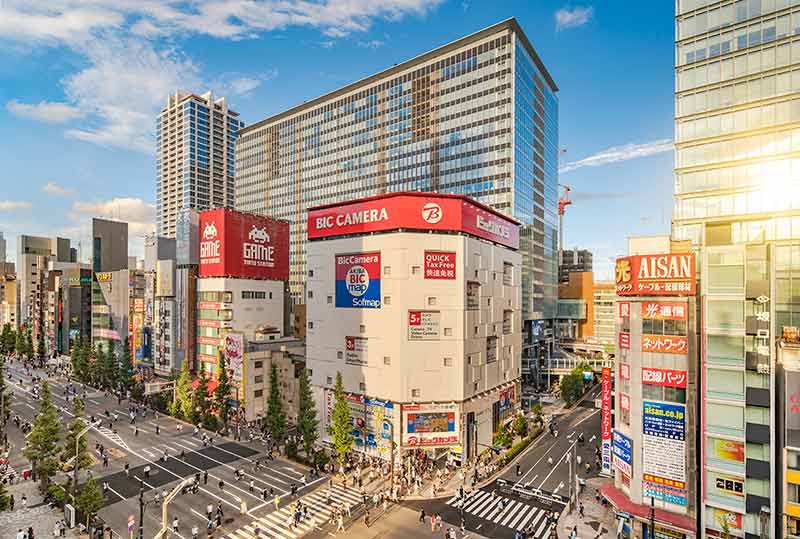
Akihabara neighbourhood, shortened to Akiba, is one of Tokyo’s most quirky neighbourhoods with access via Akihabara and Asakusabashi subway stations to the rest of Tokyo.
It attracts younger visitors to Tokyo interested in Japanese pop culture and is an excellent base if you want budget accommodation.
Head to one of the many warehouses where there will be manga collectibles, comics, video games and action figures.
As you walk around, you will see craziness at every turn.
On Sundays, the main street is for pedestrians only.
Nicknamed “Electric Town”, this district developed after World War II and today it is the best place to buy anything electrical.
Likewise, if guitars are your thing, Ochanomizu Meidai Dori is the street for you.
Yasukuni-jinja Shrine remembers Japanese war dead while there are several museums and galleries including Yushu-kan, a war museum and one specifically covering World War II.
The city’s baseball stadium is here while you may like to see a cathedral, and Akiba has one; Nicholai-do Cathedral built in 1891 by St. Nicholai.
Pros
- Heart of Otaku culture (anime, manga and video games) with plenty of themed cafes
- Electronics shopping
- Buzzy atmosphere
- Convenient transport
- Diverse dining options from fast food to traditional cuisine
Cons
- Very crowded, especially on weekends
- Limited accommodation options
- Heavy focus on consumerism
Hotels In Akihabara
Hotel Resol Akihabara
Hotel Resol is a stylish 3-star hotel that opened in 2018.
Rooms may not be large but they are impressive.
Bathrooms have a tub and the restaurants serves Japanese and Italian cuisine.
The location is “Electric Town” (or Akiba) in Akihabara and Akihabara.
Hotel MyStays Asakusabashi
Hotel MyStays in Asakusabashi is clean, modern and affordable.
Each room has free Wi-Fi, flat screen tv, refrigerator and air-con with a communal washer/dryer on each floor.
A quiet location with plenty of restaurants close by as well as a convenience store.
Citan Hostel
Citan Hostel Is 2-stars and has both private rooms for up to 4 people and dormitories, include female only.
You will enjoy the ground floor bar and café and make new friends in the communal lounge.
Also read:
- Where To Stay In Boston
- Where To Stay In Philadelphia
- Where To Stay In Mykonos
- Where To Stay In Athens
- Where To Stay In Valencia
- Where To Stay In Milan
- Where To Stay In Dubrovnik
- Where To Stay In New York City
- Where To Stay In Bangkok
- Where To Stay In Istanbul
- Where To Stay In Phuket
- Where To Stay In Mexico City
- Where To Stay In Barcelona
- Where To Stay in The Algarve
- Where To Stay In Berlin
- Where To Stay In Lisbon
- Where To Stay In Austin
- Where To Stay In Washington DC
- Where To Stay In New Orleans
- Where To Stay In Ho Chi Minh City
- Where To Stay In Hoi An
- Where To Stay In Vancouver
- Where To Stay In Mallorca
- Where To Stay In Brussels
- Where To Stay In Venice
- Where To Stay In Tokyo
- Where To Stay In Osaka
- Where To Stay In Fukuoka
- Where To Stay In Kyoto
- Where To Stay In Nagoya
- Where To Stay In Sapporo
- Where To Stay In Sydney
- Where To Stay In Brisbane
- Where To Stay In Tasmania
- Where To Stay In Singapore
- Where To Stay In Dallas
- Where To Stay In Maui
- Where To Stay In Hawaii
- Where To Stay In Amsterdam
- Where To Stay In Hong Kong
- Where To Stay In Memphis
- Where To Stay In Nashville
- Where To Stay In Houston
- Where To Stay In Malta
- Where To Stay In Crete
- Where To Stay In Cleveland
- Where To Stay In Atlanta
- Where To Stay in Salt Lake City
- Where To Stay In Porto
- Where To Stay In Hanoi
- Where To Stay In Costa Rica
- Where To Stay In Cairo
- Where To Stay In Bali
- Where To Stay In Tenerife
- Where To Stay In Madrid
- Where To Stay In Jamaica
- Where To Stay In The Bahamas
- Where To Stay In Budapest
- Where To Stay In Ibiza
- Where To Stay In Macao
- Where To Stay In Tulum
- Where To Stay In Paris
Plan Your Trip

Rent A Car – Find the best car rental rates at Discover Cars. They compare car hire companies to provide you with the best deal right now.

Find A Hotel – If you’re curious about this article and are looking for somewhere to stay, take a look at these amazing hotels.